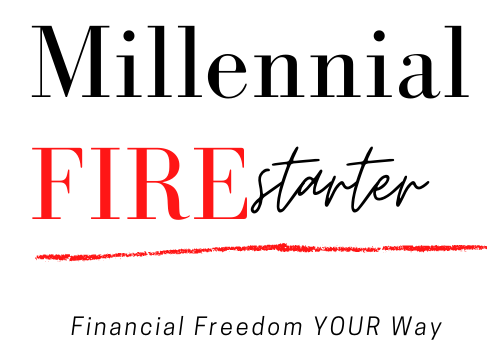

I know what you’re thinking: How do I get decent returns without putting my money at risk?! Perhaps you are saving for a house or a vacation and you just want to park your money somewhere it will grow.
A short term investment is defined as a time horizon under 3 years. These are some options you have when it comes to short-term investments.
I may earn a small commission for affiliate links in this post at no extra cost to you. Please read my disclaimer for more information.
1. High Interest Savings Account
A high interest savings account is a great way to receive interest on your money without putting it at risk. Most high yield savings accounts will pay you significantly more than a savings account at a traditional bank. This is because most of the banks that offer HISAs are not brick and mortar institutions so there are less overhead costs. This gives them the ability to be more generous with the interest rates they provide their customers. While the returns are not as much as what you would get in the stock market, it is a great option for a short-term investment. Below are a list of options for well-known reputable banks that provide high yield savings accounts:
2. CD Account
A CD is a Certificate of Deposit. This is a promise from a bank that they will pay you a fixed interest rate if you keep a certain amount in the account. If you believe you may need to tap into those funds before the term date, I would not recommend this option. However, I believe that the value of a CD is in the fixed interest rate. While interest rates are not typically volatile, changes in the federal interest rate can positively or negatively impact your returns. CDs can be a great option if you believe the national interest rates may be going down in the future and you want to lock in a good rate! The banks below are some great options if you are looking for a CD with a competitive interest rate:
3. Money Market Account
Money Market accounts operate similarly to a High Interest Savings account and CDs. There is typically a minimum balance you must keep in the account and they offer higher interest rates than a traditional savings account. Money Market Accounts should not be confused with Money Market Funds. A Money Market Fund is a type of mutual fund that invests in short term instruments. Since this is an investment vehicle, unlike Money Market Accounts, there is the potential for loss. Since Money Market Accounts are more conservative, they offer a slightly lower rate of return. One benefit that some banks offer is the ability to charge expenses directly to your account. This is great because you can treat your money market account like a checking account all while receiving a return on your money. Here are some banks that are offering money market accounts at competitive rates:
4. Treasury Notes, Bills, and Bonds
Treasury Bonds are a great way to invest your money for the short and long term. U.S. Treasury bonds can be purchased directly through Treasury Direct. One great benefit about treasury securities is that you pay less money in taxes when you invest in treasury bonds directly. While you are required to pay federal taxes, you do not have to pay State or Local taxes on the interest you earn from the securities. These savings can really add up! The minimum purchase amount is $100 but you can also auto invest any returns that you receive through Treasury Direct. If you go to Treasury Direct, you will be asked to choose between bills, notes, and bonds. This is the difference between each type of security:
Treasury Bills – Are sold in terms ranging from a few days to 52 weeks
Treasury Notes – Earn a fixed rate of interest every six months until maturity. Notes are issued in terms of 2, 3, 5, 7, and 10 years.
Treasury Bonds – Pay a fixed rate of interest every six months until maturity. They are typically issued in terms of 20 years or 30 years.
5. Bond Funds
Bond funds are great because you are able to invest in highly diversified portfolios of bonds at a low barrier to entry. They are similar to a stock ETF except the fund only holds bonds. You have your choice of treasury bonds, municipal bonds, and corporate bonds. Each type of bond comes with different types of risk. It is important to review the prospectus of a bond fund you are considering investing in to see what the fund invests in and the overall goals for the fund. You can choose bonds that have long-term, intermediate-term, or short-term time horizons. Depending on the economic climate, some might be more lucrative than others depending on the interest rate and the expectation for what the interest rate will be in the future.
Using bond funds also makes it easier to create a bond latter. A bond latter is where you have different bonds that have different maturity dates. The lower part of the rung has short-term securities and the highest rung has long-term securities. Having a bond latter is a great way to create a constant steam of income because you have other bonds in the cycle once a fund reaches maturity. It is also a good hedge depending on what is going on in the stock market.
You can invest in bond funds through a brokerage account. These are some brokerages that are great for those that are just getting started:
Decide what works for you
All of these are great options for short term investments but some may work better depending on your personal situation and goals. Consider your time horizon and decide which investment works best for you. Keep these things in mind when deciding on an option:
CDs – Remember that with CDs you will need to wait to have access to your funds based on the terms you agreed upon.
Bonds – Be aware of the maturity date, this is when you will be able to access your money again. It is important to note that bond securities and bond funds work differently.
Bond Funds – Since a bond fund is a collection of securities managed by a fund manager, you are buying into a fund on the stock exchange. This means that when you are ready to cash out, you will need to sell your bond fund similar to how you would sell a stock.
Disclaimer: The content in this post is my opinion and should not be considered financial advice. I am not a financial expert or advisor. This content is for informational and educational purposes. For more details please visit the Disclaimer Page.













